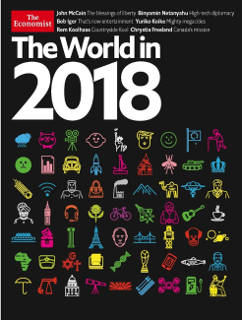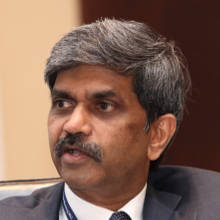The World in 2018
By The Economist
Buy it here
Insights into the forces that will shape the world, from The Economist report, ‘The World in 2018’
D ShivakumarBy The Economist

The world economy should move along at a respectable pace in 2018, unless central bankers spoil things with high interest rates. Developed and emerging markets will both contribute to growth.
Like it or not, more and more business leaders will find themselves drawn into politics. The American giants of industry have to deal with a ‘techlash’.
The Internet of Things (IoT) and artificial intelligence (AI) are remaking economies, much like electricity and railways did in the past. The scale of wealth creation and degree of inequality are similar.
Politicians will turn on the big technology giants.
A sweeping new privacy law, inelegantly named General Data Protection Regulation, will decisively shift the power over personal data from tech firms to individuals.
Few rulers grow wiser in their second term in office.
Global output in 2017 grew at its fastest since 2010, but the year was hardly buoyant. Global growth was 2.9%, below the 3% that was once considered average growth.
Emerging markets will have the best year since 2014.
Recessions typically start when central banks, eager to keep economies in check, raise interest rates too far and too fast.
In ranking a country’s weight in the world, two factors went together: population and production. Until the 19th century the two went together.
The International Monetary Fund (IMF) reckons that China’ economy has already overtaken the US in terms of purchasing power in 2014.
The United Nations thinks that India's population will surpass that of China's in 2024.
The future of drones depends as much on regulatory progress as technology prowess.
The big change for drones will be the introduction of remote identification, a sort of license plate system that enables them to identify themselves.
When you know who is operating a drone, it becomes easier to apply existing laws to its use says Brendan Schulman of DJI, the world’s largest drone maker.
Japan will be one of the first countries to make way for routine drone deliveries. Japan has set the ambitious target of doing routine drone deliveries by 2020, in time for the Tokyo Olympics.
New Tokyo fuses three cities in one: a safe city, a city of diversity and a smart city.
At the dawn of the 20th century, Tokyo was the model for many Asians wanting to modernise. Tokyo could be worthy of emulation now right around the world with its new vision.
In China, reform with Chinese characteristics means more party control over companies, more state directed industrial subsidies, the merger and transformation of state-owned enterprises (SOEs) into national champions and tighter supervision of the online economy.
In the US, the key question for 2018 will be if wage and price growth will pick up.
The Saudi problem
Two-digit $ oil price is a problem for Saudi Arabia
|
Year |
Oil price, Brent, $ per barrel |
Saudi Arabia budget balance % of GDP |
|
2012 |
112 |
13.6% |
|
2013 |
109 |
6.4% |
|
2014 |
99 |
(2.3)% |
(Cont'd)
The Saudi problem (cont'd)
Two-digit $ oil price is a problem for Saudi Arabia
|
Year |
Oil price, Brent, $ per barrel |
Saudi Arabia budget balance % of GDP |
|
2015 |
52 |
(14.8)% |
|
2016 |
44 |
(12.8)% |
|
2017 |
53 |
(8.2)% |
|
2018 Forecast |
54 | (8.3)% |
The future belongs to those who innovate. With 8.5 million people, Israel has more companies on the NASDAQ than any other country except the US.
Israeli startups receive 20% of global investment in cyber security, punching 200 times above its relative weight.
Israel recycles 87% of its waste water, five times more than the No. 2 on the list. Israeli cows produce more milk per animal than any other country.
Technology without free markets does not get you very far.
Israel became an economic tiger because it chose to be a nimble mammal rather than a fossil.
Technology alone does not guarantee our future. We must keep promoting entrepreneurship and fight excessive regulation.
Israel’s success has two lessons:
1. Innovate or perish
2. Innovate to create alliances and advance peace
South Africa is a country of paradoxes, where promise and potential sit cheek by jowl with dejection and disappointment.
In 2018, the world has the maximum number of people displaced since the aftermath of World War II. There are 114 million people in need of humanitarian aid.
China will sell 407,000 electric cars in 2018. The rest of the world will sell another 550,000. So, we will see close to a million electric cars sold in 2018.
China will sell 2 million electric cars in 2020, and 7 million in 2025.
79% of global internet use is on mobile phones. The top mobile internet nations are Hong Kong at 89%, China at 87%, Spain at 86%, Italy at 83%, the US at 83% and India at 82%.
Women’s total income was $13 trillion in 2013 and it will be $18 trillion in 2018, nearly a fourth of the global GDP, or roughly equivalent to the GDP of the US.
Top GDP growth countries in 2018
|
Country |
Growth% |
|
1. Bhutan |
9.2 |
|
2. Angola |
8.5 |
|
3. India |
7.8 |
|
4. Cambodia |
7.2 |
|
5. Bangladesh |
6.9 |
(Cont'd)
Top GDP growth countries in 2018 (cont'd)
|
Country |
Growth % |
|
6. Guinea |
6.9 |
|
7. Ghana |
6.7 |
|
8. Myanmar |
6.7 |
|
9. Cote d'Ivoire |
6.6 |
|
10. Djibouti |
6.5 |
Top GDP growth areas in 2018
| Area | Growth % |
| North America | 2.2 |
| Western Europe | 1.9 |
| Eastern Europe | 2.5 |
| Latin America | 2.0 |
| Middle East and North Africa | 3.3 |
| Sub Saharan Africa | 3.0 |
| Asia | 5 |
| Japan | 1.0 |
| Australasia | 2.4 |
Global car sales
| SUVs | Others | |
| 2015 | 40% | 60% |
| 2016 | 44% | 56% |
| 2017 | 47% | 53% |
| 2018 | 51% | 49% |
Unconscious bias will be a hot topic in HR jargon.
Talent analytics will encourage a greater focus on how best to incentivise employees. Solving famous problems for applicants, as is required by Google, is proven to be a poor predictor of long-term success.
Sceptics will be worried about what misery might be caused by a flawed boss with talent analytics data.
Between 2009 and 2015 were heady days for luxury goods. Growth was at a CAGR of 9%.
Luxury and fashion executives are obsessed with selling to millennials. Millennials and Gen Z will account for 45% of this market by 2025.
Digital is key to tap into the millennials. Millennials want experiences. Authenticity trumps extravagance. And instead of hierarchy, they value community.
Luxury brands will have to get digitally fluent and will have to move from distant aspiration to experience.
The entertainment industry has always been competitive, but technology is making it an all-out arms race.
Entertainment now needs a deeper, more personal relationship with each consumer.
The buzzword ‘disruption’ will give way to perpetual permutation.
In the future, success or failure of media companies will directly depend on the ability to create a direct two-way relationship with consumers.
Convenience will play a big role. Today’s consumers want a frictionless experience, and have lost patience when it comes to ease of use.
Since 2009, the markets have been helped by massive central bank interventions. Central banks are slowly withdrawing the stimulus.
The IMF forecasts at 3.7 % growth for the global economy in 2018. Much will depend on China where cuts in manufacturing capacities is moving to a slower growth trajectory.
Another updated directive kicking in at the start of 2018, on payment services (called PSD2), will expose banks to increased digital competition. Customers will be free to let third parties see their bank account data, allowing them to offer better returns or payment services.
A new international accounting standard, IRFS9, will require banks to make earlier provisions against possible losses to their loans.
US venture capital activity in tech companies
| Deal Value $ bln | No. of Deals | |
| 2002 | 1,320 | 11 |
| 2003 | 1,414 | 11 |
| 2004 | 1,545 | 12 |
| 2005 | 1,855 | 13 |
| 2006 | 2,034 | 15 |
| 2007 | 2,548 | 13 |
(Cont'd)
US venture capital activity in tech companies (cont'd)
| Deal Value $ bln | No. of Deals | |
| 2008 | 2,974 | 15 |
| 2009 | 2,773 | 20 |
| 2010 | 3,475 | 21 |
| 2011 | 4,583 | 30 |
| 2012 | 5,309 | 28 |
| 2013 | 6,494 | 30 |
| 2014 | 7,311 | 49 |
| 2015 | 6,938 | 60 |
Tech popularity is perversely the reason why the investment climate will prove risky.
The risk profile in tech has gone up. There are no clear next platforms to invest in.
Man vs machine
Predicted time for machine to match 50% capability of man
| Number of years for 50% from 2016 as base year | |
| Full automation of labour | 125 |
| AI research | 85 |
| Maths research | 45 |
| Surgeon | 38 |
| Write New York Times bestseller | 35 |
(Cont'd)
Man vs machine (cont'd)
Predicted time for machine to match 50% capability of man
| Number of years for 50% from 2016 as base year | |
| Retail sales person | 12 |
| 5 km race in city | 10 |
| Truck driver | 10 |
| Generate top 40 pop song | 10 |
| Explain own actions in games | 10 |
(Cont'd)
Man vs machine (cont'd)
Predicted time for machine to match 50% capability of man
| Number of years for 50% from 2016 as base year | |
| Write high school essay | 9 |
| Read text aloud | 7 |
| Assemble any Lego | 7 |
| Telephone booking operator | 7 |
| Transcribe speech | 7 |
(Cont'd)
Man vs machine (cont'd)
Predicted time for machine to match 50% capability of man
| Number of years for 50% from 2016 as base year | |
| StarCraft computer game | 5 |
| Fold laundry | 5 |
| Win world series poker | 3 |
| Win at Angry Birds | 2 |
Was this article useful? Sign up for our daily newsletter below
About the author

Shivakumar is Operating Partner at Advent International. Before this, he was President (Corporate Strategy and Business Development) at Aditya Birla Group. Earlier assignments include: Chairman & CEO at Pepsico India and prior to that, Managing Director at Nokia India. Before joining Nokia, he worked with consumer electronics maker Philips and top consumer goods firm Hindustan Unilever. He is an engineer from IIT Chennai and an MBA from IIM Calcutta.
Shivakumar has written three books: Reflections - a collection of Shivs articles; The Right Choice - Resolving Ten Career Dilemmas; and The Art of Management. The latter two are business bestsellers.
Also by me
Trending